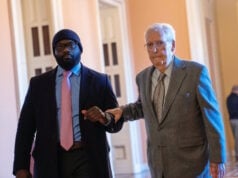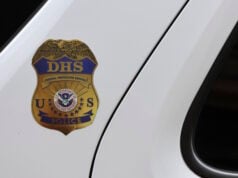
WASHINGTON — A former Pennsylvania police officer who joined the Jan. 6, 2021, attack on the U.S. Capitol that delayed certification of the 2020 presidential election results cannot be charged with obstructing an official proceeding unless a lower court finds otherwise, the U.S. Supreme Court ruled Friday.
The ruling throws into question the cases of potentially hundreds of Jan. 6 defendants who faced the same charge, as well as a portion of Department of Justice special counsel Jack Smith’s four-count indictment alleging former President Donald Trump schemed to overturn the 2020 presidential election.
In a 6-3 opinion, the justices, led by Chief Justice John Roberts, wrote that the subsection in question of an early 2000s obstruction law can only be applied to tampering with physical records.
“To prove a violation of Section 1512(c)(2), the Government must establish that the defendant impaired the availability or integrity for use in an official proceeding of records, documents, objects, or as we earlier explained, other things used in the proceeding, or attempted to do so,” Roberts wrote.
“The judgment of the D. C. Circuit is therefore vacated, and the case is remanded for further proceedings consistent with this opinion,” Roberts wrote.
Justice Ketanji Brown Jackson delivered a concurring opinion.
Justice Amy Coney Barrett, joined by Justices Sonia Sotomayor and Elena Kagan, dissented.
Effect on Jan. 6 defendants, Trump
The ruling has the potential to affect more than 355 Jan. 6 defendants who were charged with the same felony statute, which carries a fine and not more than 20 years in prison.
Dozens, including leaders of the extremist Proud Boys and Oath Keepers, have already been sentenced on the charge, according to the Department of Justice.
The case, Fischer v. United States, centered on whether Jan. 6 defendant Joseph W. Fischer broke the obstruction law when he joined the mob that breached the U.S. Capitol and delayed Congress, and Vice President Mike Pence, from certifying the 2020 presidential election results that declared Democrat Joe Biden the winner.
Trump also faces the obstruction charge as part of his four-count federal indictment that alleges he worked with others to overturn the election results in seven states, pressured Pence to join him, and whipped his base into a frenzy that culminated in the Jan. 6 attack.
Trump will almost certainly challenge the charge, as his legal team has already argued he is completely immune to it.
The obstruction provision examined by the high court is contained in Section 1512 of the Sarbanes-Oxley Act, enacted after the 2001 Enron accounting scandal.
The provision targets “whoever corruptly (1) alters, destroys, mutilates, or conceals a record, document, or other object, or attempts to do so, with the intent to impair the object’s integrity or availability for use in an official proceeding; or (2) otherwise obstructs, influences, or impedes any official proceeding, or attempts to do so.”
Physical evidence
Significant time during April’s oral arguments centered on whether the second portion of the statute hinged on the first clause, meaning the law could only be applied if physical evidence was involved.
The government argued the two parts are separate and that Fischer, who sent texts leading up to the riot and is shown on police camera footage inside the Capitol, intended to disrupt an official proceeding of Congress.
Fischer’s team argued that he didn’t actually enter the Capitol until Congress had already paused the proceeding, and that he didn’t stay very long.
A lower federal court agreed last year with Fischer’s motion to dismiss the felony charge.
A federal appeals panel in Washington, D.C., did not. Judge Florence Y. Pan — who also sat on the panel in Trump’s presidential immunity appeal — wrote in the lead opinion that the statute is “unambiguous” in its meaning of what constitutes obstructing an official proceeding.
The obstruction charge is not the only count brought against Fischer after his participation in the Jan. 6 riot.
The original indictment against him also included charges of civil disorder, assaulting, resisting, or impeding certain officers, entering and remaining in a restricted building, disorderly conduct, and parading, demonstrating, or picketing in a Capitol building.
Reaction
Florida House Democratic Leader Fentrice Driskell of Tampa lamented the ruling.
“The right to peaceful protest is fundamentally American, but rioting in an attempt to prevent the transfer of power between presidential administrations is not,” Driskell said in a written statement.
“I am disheartened by today’s SCOTUS ruling which will make it harder to hold insurrectionists accountable for their actions on January 6. As the case goes back to the lower courts for consideration, my sincere hope is that the focus will be on upholding the rule of law so that we can bring to justice those who tried to undermine our most sacred American values,” she added.
The post U.S. Supreme Court ruling on obstruction law helps cases of Jan. 6 defendants appeared first on Florida Phoenix.
Disclaimer
The information contained in South Florida Reporter is for general information purposes only.
The South Florida Reporter assumes no responsibility for errors or omissions in the contents of the Service.
In no event shall the South Florida Reporter be liable for any special, direct, indirect, consequential, or incidental damages or any damages whatsoever, whether in an action of contract, negligence or other tort, arising out of or in connection with the use of the Service or the contents of the Service.
The Company reserves the right to make additions, deletions, or modifications to the contents of the Service at any time without prior notice.
The Company does not warrant that the Service is free of viruses or other harmful components












